|
De Vlaamse schrijver Jef Geeraerts werd geboren op 23 februari 1930 in Antwerpen. Zie ook alle tags voor Jef Geeraerts op dit blog.
Uit: Cro-Magnon
Een donkerblauwe Renault Mégane coupé 2004 met kenteken 482BZ13 vertraagde en sloeg linksaf aan de T van de D4 met de D943 van Gordes naar Apt, in het département Vaucluse. De smalle asfaltweg lag er verlaten bij. De maan hing als een zilveren forel aan de pikzwarte hemel vol sterren. Het was zacht en windstil. De weg liep tussen gemengd loofbos. Hij was bochtig en steeg geleidelijkaan vanaf Apt naar Cadenet in zuidelijke richting naar de vallei van Aiguebrun.
Na ongeveer twaalf kilometer vertraagde de Renault en reed een smal bospad in. Wat verder hield hij stil tussen lage chênes verts. De motor en de koplampen werden uitgezet. De binnenverlichting ging aan. De man achter het stuur, gekleed in een zwart trainingspak, keek even op zijn horloge, haakte een gsm van zijn broekriem, en tikte een nummer.
Het display van de gsm lichtte op. Het was opvallend groot, maar in de plaats van de gewone data verscheen er een digitale, in vierkanten verdeelde ministafkaart met coördinaten. Hij drukte op een knopje tot de cijfers van de coördinaten goed leesbaar werden. Het apparaat leek alleen maar op een gsm. Het was eigenlijk een gps Magellan van Duitse makelij, een peperdure gadget, fel in trek bij de jonge generatie van zogenaamde backpackers, die nooit hadden geleerd met kaart en kompas om te gaan.
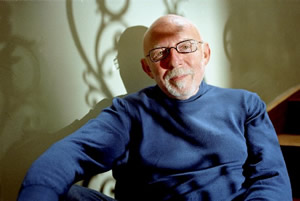
Jef Geeraerts (Antwerpen, 23 februari 1930)
De Duitse schrijver, dichter en cabaretier Erich Kästner werd geboren in Dresden op 23 februari 1899. Zie ook alle tags voor Erich Kästner op dit blog.
Uit: Emil und die Detektive
"Sehr viele ausländische Wagen?", fragte Emil.
"Woher soll ich das wissen?", sagte Frau Wirth und musste niesen. Ihr war Seifenschaum in die Nase gekommen.
"Na, nun mach aber, dass du fertig wirst", drängte die Mutter. "Deinen guten Anzug hab ich im Schlafzimmer zurechtgelegt. Zieh ihn an, damit wir dann sofort essen können, wenn ich Frau Wirth frisiert habe."
"Was für'n Hemd?", erkundigte sich Emil.
"Liegt alles auf dem Bett. Und zieh die Strümpfe vorsichtig an. Und wasch dich erst gründlich. Und ziehe dir neue Schnürsenkel in die Schuhe. Dalli, dalli!"
"Puh!", bemerkte Emil und trollte sich.
Als Frau Wirth, schön onduliert und mit ihrem Spiegelbild zufrieden, gegangen war, trat die Mutter ins Schlafzimmer und sah, wie Emil unglücklich herumlief.
"Kannst du mir nicht sagen, wer die guten Anzüge erfunden hat?"
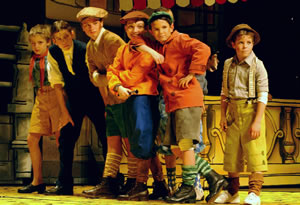
Scene uit de musical van Marc Schubring en Wolfgang Adenberg uit 2001
"Nein, tut mir Leid. Aber warum willst du's wissen?"
"Gib mir die Adresse und ich erschieße den Kerl."
"Ach, hast du's schwer! Andere Kinder sind traurig, weil sie keinen guten Anzug haben. So hat jeder seine Sorgen...Ehe ich's vergesse: Heute Abend lässt du dir von Tante Martha einen Kleiderbügel geben und hängst den Anzug ordentlich auf. Vorher wird er mir aber ausgebürstet. Vergiss es nicht! Und morgen kannst du schon wieder deinen Pullover, dieses Räuberjackett, anziehen. Sonst noch was? Der Koffer ist gepackt. Die Blumen für die Tante sind eingewickelt. Das Geld für Großmutter gebe ich dir nachher. Und nun wollen wir essen. Kommen Sie, junger Mann!" Frau Tischbein legte den Arm um seine Schulter und transportierte ihn nach der Küche.
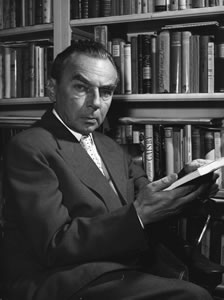
Erich Kästner (23 februari 1899 - 29 juli 1974)
De Britse schrijver Bernard Cornwell werd geboren op 23 februari 1944 in Londen. Zie ook mijn blog van 23 februari 2009 en ook mijn blog van 23 februari 2010 en ook mijn blog van 23 februari 2011.
Uit: The Last Kingdom
My name is Uhtred. I am the son of Uhtred, who was the son of Uhtred and his father was also called Uhtred. My father's clerk, a priest called Beocca, spelt it Utred. I do not know if that was how my father would have written it, for he could neither read nor write, but I can do both and sometimes I take the old parchments from their wooden chest and I see the name spelled Uhtred or Utred or Ughtred or Ootred, and I look at the deeds which say that Uhtred, son of Uhtred is the lawful and sole owner of the lands that are carefully marked by stones and by dykes, by oaks and by ash, by marsh and by sea, and I dream of those lands, wave-beaten and wild beneath the wind driven sky. I dream, and know that one day I will take back the land from those who stole it from me.
I am an Ealdorman, though I call myself Earl Uhtred, which is the same thing, and the fading parchments are proof of what I own. The law says I own that land, and the law, we are told, is what makes us men under God instead of beasts in the ditch. But the law does not help me take back my land. The law wants compromise. The law thinks money will compensate for loss. The law, above all, fears the bloodfeud. But I am Uhtred, son of Uhtred, and this is the tale of a bloodfeud. It is a tale of how I will take from my enemy what the law says is mine. And it is the tale of a woman and of her father, a king.
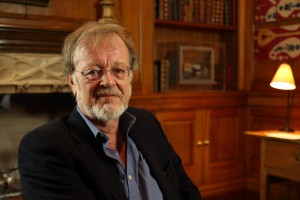
Bernard Cornwell (Londen, 23 februari 1944)
De Duitse dichteres en schrijfster Elisabeth Langgässer werd geboren op 23 februari 1899 in Alzey. Zie ook mijn blog van 23 februari 2009 en ook mijn blog van 23 februari 2010 en ook mijn blog van 23 februari 2011.
In den Mittag gesprochen
Schläfriger Garten. Gedankenlos
wie der Daume über dem Daume.
Sage, wer trägt die Birne im Schoß,
den Apfel, die Eierpflaume.
Breit auseinander setzt Schenkel und Knie,
weil schon Spilling und Mirabelle
höher sich wölben voll Saft und Magie,
die Natur auf der Sommnerschwelle.
Bis an den Umkreis der Schale erfüllt
sind die Früchte nur mit sich selber,
und in die flimmernden Lüfte gehüllt,
überläuft es sie blauer und gelber.
Pochender Aufschlag. Was trägt und enthält,
ist das Ganze von allen geboren.
Innen ward außen. Was ungepflückt fällt,
geht wie Traum an das Ganze verloren.
Scharren im Laube. Ein brütendes Huhn
sitzt getrost auf zerbrochenem Rade.
Zeit, wohin fließest du? Nach Avalun ...
Süßes, wie heißest du? Kern in den Schuhn
purpurblaun, gelben? Du wirkendes Ruhn?
Und ein jegliches antwortet: Gnade!
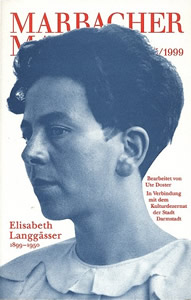
Elisabeth Langgässer (23 februari 1899 25 juli 1950)
De Engelse schrijver Samuel Pepys werd geboren op 23 februari 1633 in Londen. Zie ook alle tags voor Samuel Pepys op dit blog.
Uit: The Diary of Samuel Pepys
Monday 22 February 1668/69
Up, and betimes to White Hall; but there the Duke of York is gone abroad a-hunting, and therefore after a little stay there I into London, with Sir H. Cholmly, talking all the way of Tangier matters, wherein I find him troubled from some reports lately from Norwood (who is his great enemy and I doubt an ill man), of some decay of the Mole, and a breach made therein by the sea to a great value. He set me down at the end of Leadenhall Street, and so I home, and after dinner, with my wife, in her morning-gown, and the two girls dressed, to Unthankes, where my wife dresses herself, having her gown this day laced, and a new petticoat; and so is indeed very fine. And in the evening I do carry them to White Hall, and there did without much trouble get into the playhouse, there in a good place among the Ladies of Honour, and myself also sat in the pit; and there by and by come the King and Queen, and they begun Bartholomew Fayre. But I like no play here so well as at the common playhouse; besides that, my eyes being very ill since last Sunday and this day sennight, with the light of the candles, I was in mighty pain to defend myself now from the light of the candles. After the play done, we met with W. Batelier and W. Hewer and Talbot Pepys, and they follow us in a hackney-coach: and we all stopped at Hercules Pillars; and there I did give them the best supper I could, and pretty merry; and so home between eleven and twelve at night, and so to bed, mightily well pleased with this days work.
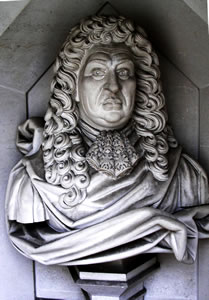
Samuel Pepys (23 februari 1633 26 mei 1703)
Guildhall Art Gallery, Londen
Zie voor nog meer schrijvers van de 23e februari ook mijn blog van 23 februari 2011 deel 2 en eveneens deel 3
23-02-2012 om 19:25
geschreven door Romenu 
Tags:Jef Geeraerts, Erich Kästner, Bernard Cornwell, Elisabeth Langgässer, Samuel Pepys, Romenu
|

